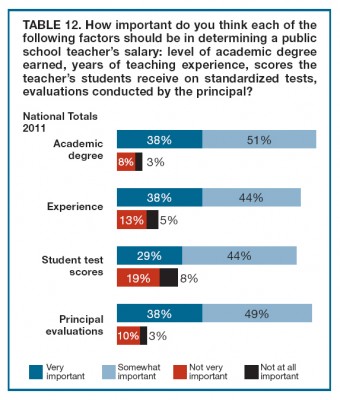A new public opinion poll on the nation’s public schools reveals a number of interesting findings. The poll, conducted every year since 1969 by Phi Delta Kappa and Gallup, asked 1,000 people about a variety of education topics—from trust in teachers to the use of technology in classrooms.
You can find all of the poll’s results here, but we’ve distilled the essentials for you:
Most people trust public-school teachers and want them to have more freedom in the classroom. Even though a solid majority (68 percent) of respondents said most of the news they hear about teachers is bad, an even higher percentage (71 percent) said they trust public-school teachers to do their jobs. And more still—73 percent—said teachers should be given greater flexibility and not have to follow a strict curriculum.
 Test scores aren’t the most important thing when it comes to teacher compensation and layoffs. In determining a teacher’s pay, respondents said academic degrees, principal evaluations and a teacher’s experience are more important than test scores. The use of test scores was seen as more appropriate in deciding which teachers to lay off, coming just behind principal evaluations as the most important factors to consider.
Test scores aren’t the most important thing when it comes to teacher compensation and layoffs. In determining a teacher’s pay, respondents said academic degrees, principal evaluations and a teacher’s experience are more important than test scores. The use of test scores was seen as more appropriate in deciding which teachers to lay off, coming just behind principal evaluations as the most important factors to consider.
The public wants teachers from the ranks of top achievers. More than 75 percent of people polled said they think top high-school students should be recruited to become teachers. Nearly three-quarters of respondents also said they’d encourage their brightest friend to become a teacher. The desire for better teachers even outweighed the need for top scientists, according to the poll. A slightly higher percentage of people (48 percent) said top science and math students should become teachers versus those who said they should pursue a career in science (47 percent).
Technology is good, but learning should happen at school. Almost everyone polled said that having the Internet in schools is important (91 percent) and that access to computer technology in schools is important (95 percent). However, 59 percent are opposed to having high-school students take online classes at home. And—even more telling—half of respondents said it’d be better to have students taught in person by a less effective teacher than online by a more effective teacher.
Teachers’ unions get mixed reviews. Nearly half of those polled—47 percent—said they think teachers’ unions have hurt the quality of public schools. That’s up from the 38 percent who said so in 1976. Yet when it comes to the battles between teachers unions’ and state governors looking to reduce their influence, more than half (52 percent) said they side with the unions.
We like school choice—but vouchers not so much. Nearly three-quarters of those polled—74 percent—favor letting parents choose which schools their children attend. That’s up from 62 percent in 1991. However, 65 percent oppose letting parents send their children to private schools at taxpayer expense, up from 52 percent in 2002.



